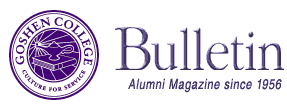

March 2002 Issue Main Page
—
About this issue
—
Job, career, vocation...
—
Finding meaningful work...
—
Discovering call through service
—
Speaking our needs to the heart of reality
—
What do I want to be when I grow up?...
—
Yearning for identity, discovering life...
—
Restoring what is broken...
—
The End is the beginning

Finding meaningful work: Career ServicesBy Stuart W. Showalter, director of career servicesFinding meaningful work after college is one of the important strategic goals students set for themselves when they enter college – and parents, too, clearly expect that a college education will chart some kind of career direction. Every other year, first-year students are asked a series of nationally normed questions about their college choice and their goals for the immediate future. During the past half-decade two-thirds of Goshen College students responded that “to be able to get a better job” is a very important reason for going to college. Only two other reasons ranked higher in the 2000 survey: “To learn things that interest me (called very important by 84 percent) and “to gain general education” (noted as very important by 71 percent). Only 41 percent of the 2000 respondents said that “to make more money” is an important reason for going to college! In Goshen College Career Services, we assist students in the process of assessing their interests and aptitudes and introducing them to a variety of service, internship and employment opportunities. To keep us focused, we adopted a mission statement in the year 2000 for our department: “Career services: helping students discover their vocation.” During the past five years, career services has expanded its scope, strengthened by a significant grant from Lilly Endowment Inc. Fred Litwiller, retired director of career services, was instrumental in conceptualizing and administering the activities funded by the grant. In year one, career services was relocated adjacent to a high-traffic area of the Administration Building, and a computer classroom was created and equipped to enable students to publish their résumés on the World Wide Web. The career services staff was then expanded to strengthen GC’s connections to Indiana businesses and not-for-profit organizations. And career services Web pages were greatly enhanced, culminating in the creation of the Goshen College Job Bank – a virtual meeting place for employers, students and alumni. The GC Job Bank, found at, www.goshen.edu/careerserv/jobs/, represents a giant stride forward, benefiting both students and employers. Under the direction of GC Web specialist Pete Oakley, the job bank went public last summer and immediately captured the attention of users. A total of 619 job openings have been posted since Aug. 1, 2001. The database also includes profiles of 927 employers. Employers have been posting position announcements directly to the site in 15 categories, including four categories for voluntary service opportunities and three categories of internships. More than half of the positions posted to date represented full-time jobs. The newest category, “teaching position,” was added in December 2001 and has already attracted nearly 60 job announcements. Seniors and others certified to teach can now learn about openings in their field after clicking the mouse on their computer just a few times. Nelda Johnson, long-time assistant in career services who administers the posting of teaching vacancies to the Web, no longer needs to send paper announcements in hit-or-miss fashion to teacher candidates. Employers also have more information at their fingertips at www.goshen.edu/careerserv/employers/, where they can search directly through résumés posted by students. The online job bank enables them to screen candidates by major or class year – for example, seniors only. In February 2002, an employer would have found 81 different résumés to review. Additional résumés continued to be posted as seniors consider post-commencement work or some form of service and other students take initiative to land a summer internship. While appreciating the efficiency and power of our new Web pages, career services is strongly committed to helping students learn about the world of work and service in interpersonal settings. Our efforts begin with an orientation session for all new students and their parents during their first weekend on campus, and might end with a career counseling session with an alumnus who graduated a year or two earlier. Here are some ways we connect directly with GC students:
Three years ago, our staff, especially assistant director Anita Yoder, provided leadership in creating the college’s Celebrate Service Day. On a Wednesday in September, GC students, faculty and staff disperse into the community to volunteer with a variety of agencies. Faculty have noted the success of the day and approved a three-year extension of this effort during a January meeting. The fourth Celebrate Service Day will be held Sept. 25, 2002. Participants have noted the value of such a day in their evaluations:
Career services also developed and maintains an active linkage with Indiana Campus Compact, an organization which encourages colleges and universities to become more engaged with their local communities. Four faculty members secured modest grants from ICC, enabling them to teach their students in new ways while improving relationships with the community. Our ICC connection helped us host a fall regional meeting for other area colleges and universities, with a keynote address from Edward Zlotkowski, a national expert on community-based learning. We continually strive to fulfill our mission of helping students to discover their vocation. With Parker Palmer in Let Your Life Speak (see article on p. 10), we see vocation “not as a goal to be achieved but as a gift to be received. Discovering vocation does not mean scrambling toward some prize just beyond my reach but accepting the treasure of true self I already possess. Vocation does not come from a voice ‘out there’ calling me to become something I am not. It comes from a voice ‘in here’ calling me to be the person I was born to be, to fulfill the original selfhood given me at birth by God.” |
| Top of page |
